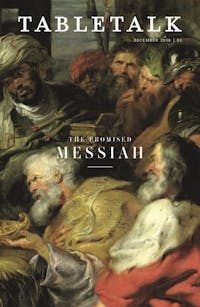
Request your free, three-month trial to Tabletalk magazine. You’ll receive the print issue monthly and gain immediate digital access to decades of archives. This trial is risk-free. No credit card required.
Try Tabletalk NowAlready receive Tabletalk magazine every month?
Verify your email address to gain unlimited access.
The prophet Isaiah did not have a Christmas tree. He had a stump. A stump with a single shoot growing from it (Isa. 11:1). That is a real Christmas tree according to Isaiah. But what does it mean? Why does the prophet call our attention to this strange little Christmas stump?
It is a picture of the promised Messiah. A savior who will be the king. He is a shoot from the stump of Jesse (11:1). Jesse is the father of King David. But now all that is left of David’s glorious kingdom is a stump, just as the Lord promised Isaiah at his call (6:13).
The people of God have fallen away. They have turned from their God but “the steadfast love of the Lord never ceases” (Lam. 3:22). He promises to raise up His deliverer out of this bleak and desperate situation, out of this humble and obscure family. And he will be like a vulnerable new shoot growing on the forest floor. God’s promised redeemer appears on the scene in obscurity. He appears at first to be weak and vulnerable. He will come up out of desperate conditions, in apparent weakness, but his character and reign will be majestic.
It will be the Holy Spirit’s presence with him that will sanctify and empower him. “The Spirit of the Lord shall rest upon him” (Isa. 11:2). The anointing of kings in Israel was a symbolic representation of the Spirit of the Lord being poured out on them so that they might lead the people with wisdom, righteousness, faithfulness, and power (see 1 Sam. 16:13). By the Spirit, this branch is enabled to know what is right and to execute his reign accordingly.
When God’s Messiah arrives, we discover that He was not only anointed with the Spirit, as kings of old were, but that He was actually conceived in the power of the Holy Spirit (Luke 1:35). From His birth to His resurrection (Rom. 1:4), Jesus is the man of the Spirit par excellence. At every stage of His life and ministry, the Spirit guides, directs, and empowers Him. He knows what is needed to redeem His own and is empowered by the Spirit to save accordingly.
The secret to His wise power is His Spirit-given delight in the fear of the Lord (Isa. 11:3). He delights in fear—a curious combination. The fear of the Lord is the beginning of wisdom because the one who fears the Lord will fear no one else. This is what enables Him to be an equitable Judge (11:4–5).
This is the heart of kingship. He is a merciful Judge to the poor and meek (v. 4). Blessed are the meek, Jesus said. The meek are those who know their need and come humbly to their King for protection and care.
But, He is also a fiercely righteous Judge who “shall strike the earth with the rod of his mouth” and “with the breath of his lips he shall kill the wicked” (v. 4). He will breathe on the proud and blow them away. Righteous and good kings bring justice to the earth. Jesus is the Judge (John 5:22).

Justice produces peace. By His Spirit endowed wisdom and in the fear of the Lord, He ushers in a worldwide kingdom of peace. There you find animals who should be eating one another dwelling in harmony (Isa. 11:6–7) and children playing with snakes (v. 8). Echoes of Eden. It is a world where peace has been restored. This is what good kings do. They establish peace.
After the fall of Adam, we get animal planet, the wild kingdom. Disharmony and conflict run through the whole of the created order. But here, predator and prey have transformed natures (v. 7), yielding peace. Even a child will once again exercise dominion over them, as God purposed from the start (v. 6; see Gen. 1:28).
The seed of the serpent will no longer be feared (Isa. 11:8; see Gen. 3:15). In Jesus, the head of the serpent will be crushed, the enemy vanquished. Here is the prophetic firstfruits of that peace. Jesus has come as the Prince of Peace (Isa. 9:6). “He comes to make his blessings flow, far as the curse is found.”
And how do we become citizens of His kingdom, heirs of this peace? Isaiah tells us: “The earth shall be full of the knowledge of the Lord as the waters cover the sea” (11:9). We know and trust and love the King, the Lord. People from all the foreign nations of the earth will come to know the Lord through this Messiah-King (v. 11).
Do you know Him? Have you bowed the knee before Him and confessed that He is your King and your Savior?
For all who do know Him, Isaiah promises that His resting place is glorious (v. 10). Peace with God, protection from sin and Satan, comfort in the Spirit, no condemnation—it’s all there; do you see it? Do you see that stump, that shoot, that King? Merry Christmas.
